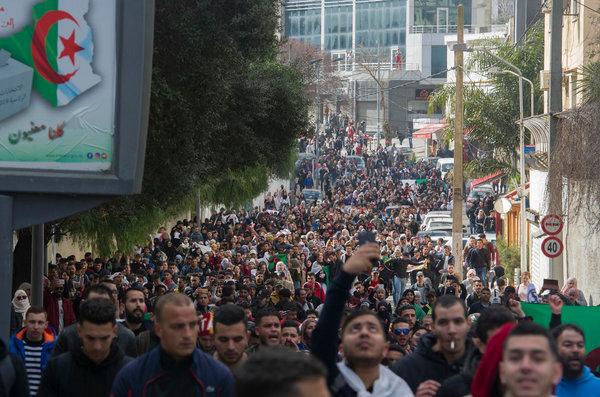By Rene Wadlow
Street demonstrations began in Algiers on 22 February 2019 and quickly spread to other cities in Algeria. The demonstrations, often led by young people, are massive on Fridays, the chief day of rest. The first demands were that President Abdelaziz Boutefika not stand for a fifth term as president having already been president for 20 years since 1999. The demands were all the more reasonable that Boutefika had had a stroke in 2013 and was unable to walk and largely could not speak. He had been seriously ill in 2005 and was in week condition from 2005 to 2013 when his health deteriorated seriously. He was often in Switzerland for medical treatment and was rarely seen in public. It is said that his brother Said Boutefika had been making decisions but is now seriously ill as well.
Thus, the Army Chief of Staff, General Ahmed Gaed Salah, a key figure of the regime, has called upon the Constitutional Council to invoke article 102 of the constitution to state that the long-term health of the President makes him unfit to hold the office. The article, taken over from the French Constitution, holds that the President of the Higher Chamber be interim President for up to 45 days and that elections for President then be held.
While the first demands of the broadly-based protests focused on the person of Abdelaziz Boutefika, the focus has now broadened to demand that the whole close-kit group, often called a “clan” who have held power since independence in 1962, be changed. Since 1963, there have been some changes in the visible leadership, but, in practice, the “clan” is still there. It is a small group of people, some still in the higher ranks of the army and others who had been in the army but who had moved over to civilian life to take positions in the oil and gas business or in government, especially the Ministry of Industry and the Ministry of Energy.
Oil and gas represent some 95% of export revenue, and the energy revenue has not been used to broaden the economic base. The “clan” is widely thought of as corrupt, using the oil revenue for their own benefit. The “Panama Papers” mentioned a good number of the “clan” having created off-shore companies. Trials related to “kick backs” from Italian and Canadian energy companies have also helped to create the image of a self-interested political group in power. Transparency International has highlighted the high perception of corruption in Algeria.
The issue which is now open and which merits close watching is how deep will be the changes in Algeria. There could be a small change among the most visible members of the “clan”. They have already put money safely outside Algeria and are well past retirement age.
There could be a slightly larger change of persons. There will be some time, unclear how much, before the new team takes power. There is enough time for people to find Swiss banks for a comfortable retirement. However the basic structures of power would change little.
There could be a relatively deep change. Some people are calling for a “Second Algerian Republic”. There will be in any case a change of generation. Even if the army continues to play a key role, there are younger officers who are the same generation as many of the protesters and who share a desire for change.
Political opposition to the current “clan” is largely unstructured. There is no coherent group of persons “waiting in the wings”. Opposition has often been in geographically diverse parts of the country making it hard to have national opposition leaders.
Algeria is a key State of the North African region with all the States undergoing changes. Even a good weatherman has difficulties to know the way the wind is blowing.
Rene Wadlow, President, Association of World Citizens










